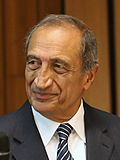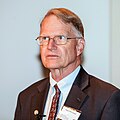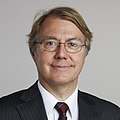| The Crafoord Prize | |
|---|---|
 | |
| Awarded for | astronomy and mathematics, biosciences, geosciences or polyarthritis research |
| Country | Sweden |
| Presented by | Royal Swedish Academy of Sciences |
| Reward | 8,000,000 Swedish kronor |
| First award | 1982 |
| Website | crafoordprize |
The Crafoord Prize (Swedish : Crafoordpriset) is an annual science prize established in 1980 by Holger Crafoord, a Swedish industrialist, and his wife Anna-Greta Crafoord following a donation to the Royal Swedish Academy of Sciences. [1] It is awarded jointly by the Academy and the Crafoord Foundation in Lund, with the former selecting the laureates. [2] The Prize is awarded in four categories: mathematics and astronomy, geosciences, biosciences (with an emphasis on ecology) and polyarthritis, [1] the final one because Holger suffered from severe rheumatoid arthritis in his later years. [3]
Contents
The disciplines for which the Crafoord Prize is awarded are chosen so as to complement the Nobel Prizes. [2] Only one award is given each year, according to a rotating scheme – astronomy and mathematics, then polyarthritis, geosciences and biosciences. [4] Since 2012, the prizes in astronomy and mathematics are separate and awarded at the same time; prior to this, the disciplines alternated every cycle. [2] The Crafoord Prize in polyarthritis was previously only awarded when a special committee decided that substantial progress in the field had been made. [2]
The recipient of the Crafoord Prize is announced every year in mid-January and the prize is presented in April or May on "Crafoord Days", [1] by a member of the Monarchy of Sweden. As of 2026 [update] , the prize money is 8,000,000 Swedish kronor (US$886,000). [1]
The Prize is usually awarded to one recipient, but there can be as many as three. [2] The inaugural laureates, Vladimir Arnold and Louis Nirenberg, were awarded the prize in 1982 for their work in the field of non-linear differential equations. Since then, the winners of the Prize have predominantly been men. The first woman to be awarded the Prize was astronomer Andrea Ghez in 2012.



























































